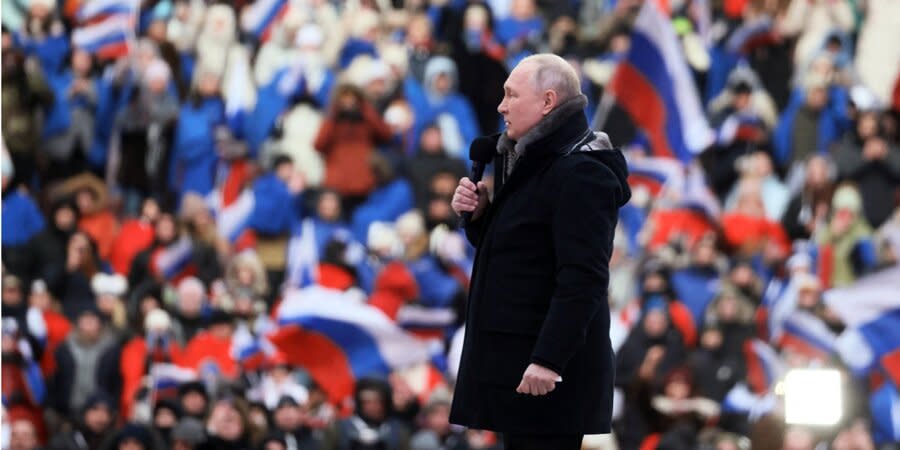Split between Wagner and defense ministry widens, Kremlin seeks to undermine Moldova

- Oops!Something went wrong.Please try again later.
- Oops!Something went wrong.Please try again later.
However, at this stage, the Russian army does not have enough resources even for an offensive in Ukraine, ISW analysts believe.
In Putin’s four-minute speech at Luzhniki Stadium in Moscow on Feb. 22, the Russian dictator once again referred to his imperialist narrative that Russia is allegedly fighting for "historical frontiers."
Read also: Putin’s latest address failed to articulate specific goals for war in Ukraine, says ISW
He previously said this a year ago, on the eve of the full-scale invasion of Ukraine.
ISW analysts point out that with this approach, the notion of Russia's "historical lands" can be used to justify aggression against virtually any of Russia's neighbors, as well as against Moldova and Central Asian states that do not share a border with Russia — as they all contain territories that at some point were part of either the Soviet Union, the Russian Empire, or both.
Putin's speech came shortly after his decision to cancel his decree on measures to implement Russia's foreign policy course, in which Russia had committed itself to seeking "ways to resolve the Transnistrian problem on the basis of respect for the sovereignty, territorial integrity and neutral status of the Republic of Moldova" and on the basis of the UN Charter.
Read also: Russia has ambitious goals for great offensive, but will fail says Budanov
The repeal of this 2012 decree does not mean that Putin intends to attack Moldova — as he does not have the military capabilities to do so — but it does indicate an escalation of his efforts to undermine Moldova as a state, ISW notes.
Ukrainian intelligence officials continue to maintain that Russia lacks the manpower and resources necessary to support its new offensive operations in Ukraine. Vadym Skibitsky, a representative of the Ukrainian Defense Intelligence, told news agency the Associated Press that in early February Russian forces intensified their offensive in at least four or five areas in Luhansk, Donetsk, and Zaporizhzhya oblasts, but have not yet achieved significant success — although their resources, including human resources, continue to be depleted.
Skibitsky added that Russian forces are concentrating their efforts on capturing Kupyansk, Lyman, Bakhmut, Maryinka, Avdiyivka and Vuhledar.
In addition, Ukraine’s spy chief Kyrylo Budanov said in an interview with business magazine Forbes that the Russian offensive is so ineffective that it is "almost unnoticeable." He also noted that the aggressor is forced to ration artillery rounds.
"More or less normal use of ammunition (can be seen) now only in Bakhmut and on the Lyman axis," as well as in Vuhledar. "In all other sectors, ammunition is being spared," stated Budanov.
Read also: Ukraine to see decisive battles in spring, says Ukraine’s spy chief
That is why, according to him, in the area of Bakhmut and Vuhledar the Russian army has largely switched from artillery and mechanized attacks to infantry attacks (due to lack of shells and armored vehicles).
Budanov also said that Russia has sent more than 90% of its 316,000 mobilized troops to the front line. "This once again confirms the estimates of the West and ISW that the Russian armed forces do not have significant unused combat-ready reserves," the institute's analysts conclude.
Wagner mercenary company owner Yevgeny Prigozhin has directly accused the Russian Ministry of Defense of delivering insufficient supplies of ammunition to his units, sparking “intense backlash” in the Russian information space and thus confirming ISW's earlier assessment of a growing split between the Wagner Group and the Defense Ministry.
Read also: Russian Defense Minister is in conflict with Wagner PMC
Prigozhin accused the Russian Defense Ministry of lying, claiming that the Wagner units had received only about 20% of the artillery ammunition they had been promised. Prigozhin called it "spitting at the Wagner PMC" and published documents in which he contrasted the needs of his PMC for shells with what the Russian Defense Ministry actually provides to the Wagner Group.
Prigozhin supplemented these documents with a photo with dozens of corpses of Wagner mercenaries, stating that they died allegedly due to the lack of artillery support during the assaults.
Many prominent Russian "milbloggers" rushed to defend Prigozhin, spreading his statements and supporting the claims against the Defense Ministry and accusations of "failing to support the allegedly most effective Russian forces in Ukraine," ISW said, describing the reaction.
Prigozhin's complaints also confirm that his previous attempts to boast of the Wagner PMC's "independence" from the Russian Defense Ministry were a lie, analysts say.
Other ISW findings over the past day:
U.S. State Department Spokesperson Ned Price stated that the U.S. government is concerned about the potential strengthening of Russia-China relations;
Russian forces are likely attempting to increase the tempo of their offensive operations along the Kupyansk-Lyman line;
Some Russian sources refuted other Russian claims about the intensification of offensive operations in western Luhansk Oblast;
Russian forces continued to conduct ground attacks throughout the Donetsk Oblast front line and secured marginal territorial gains around Bakhmut;
US intelligence officials stated that Russian President Vladimir Putin may mobilize significantly more Russian personnel.
Map of hostilities: Russian offensive in Donbas, battle for Bakhmut, fighting in Zaporizhzhya Oblast and northeast Ukraine
We’re bringing the voice of Ukraine to the world. Support us with a one-time donation, or become a Patron!
Read the original article on The New Voice of Ukraine

